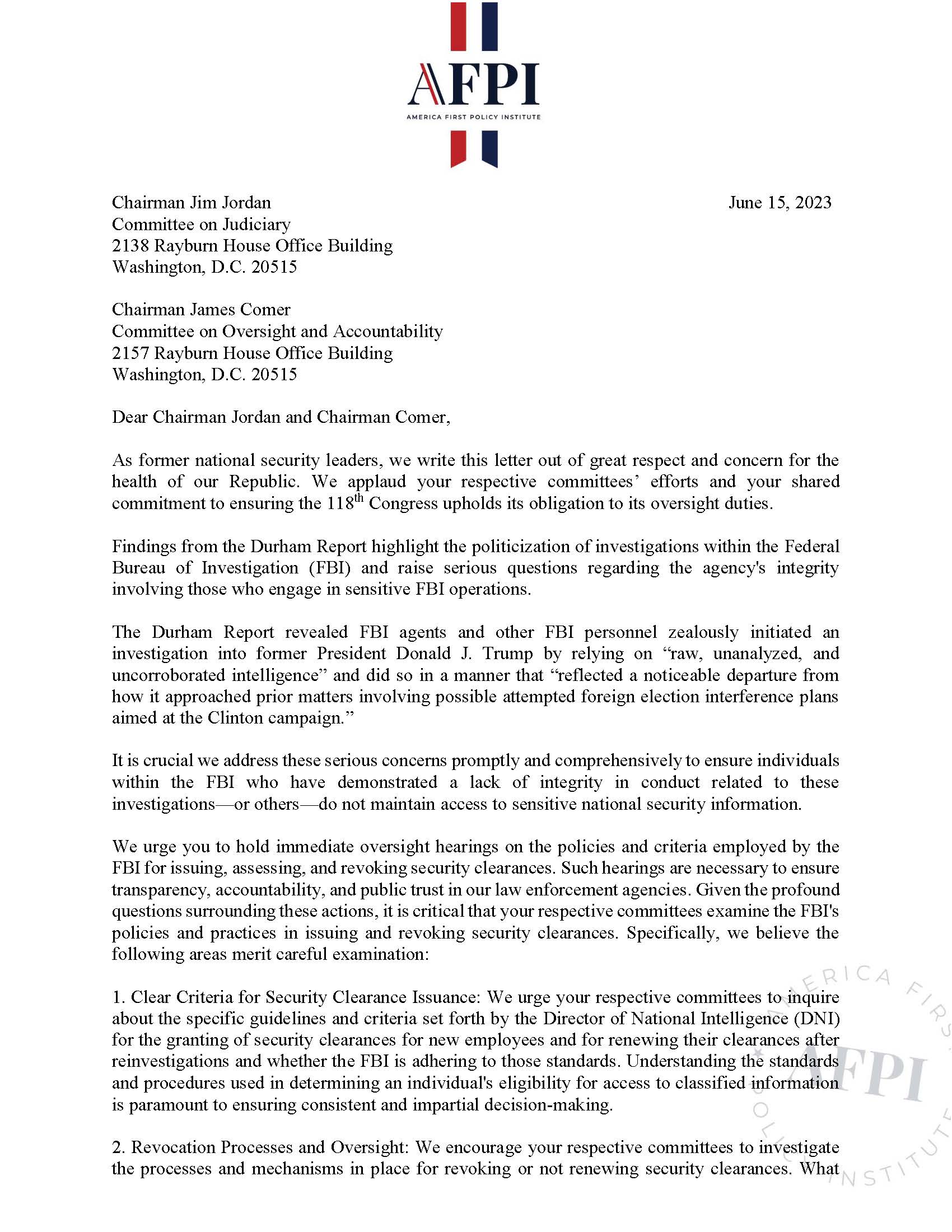National Security Experts Urge Congress to Investigate the Investigators
Chairman Jim Jordan
Committee on Judiciary
Select Subcommittee on the Weaponization of the Federal Government
2138 Rayburn House Office Building
Washington, D.C. 20515
Chairman James Comer
Committee on Oversight and Accountability
2157 Rayburn House Office Building
Washington, D.C. 20515
Dear Chairman Jordan and Chairman Comer,
As former national security leaders, we write this letter out of great respect and concern for the health of our Republic. We applaud your respective committees’ efforts and your shared commitment to ensuring the 118th Congress upholds its obligation to its oversight duties.
Findings from the Durham Report highlight the politicization of investigations within the Federal Bureau of Investigation (FBI) and raise serious questions regarding the agency's integrity involving those who engage in sensitive FBI operations.
The Durham Report revealed FBI agents and other FBI personnel zealously initiated an investigation into former President Donald J. Trump by relying on “raw, unanalyzed, and uncorroborated intelligence” and did so in a manner that “reflected a noticeable departure from how it approached prior matters involving possible attempted foreign election interference plans aimed at the Clinton campaign.”
It is crucial we address these serious concerns promptly and comprehensively to ensure individuals within the FBI who have demonstrated a lack of integrity in conduct related to these investigations—or others—do not maintain access to sensitive national security information.
We urge you to hold immediate oversight hearings on the policies and criteria employed by the FBI for issuing, assessing, and revoking security clearances. Such hearings are necessary to ensure transparency, accountability, and public trust in our law enforcement agencies. Given the profound questions surrounding these actions, it is critical that your respective committees examine the FBI's policies and practices in issuing and revoking security clearances. Specifically, we believe the following areas merit careful examination:
- Clear Criteria for Security Clearance Issuance: We urge your respective committees to inquire about the specific guidelines and criteria set forth by the Director of National Intelligence (DNI) for the granting of security clearances for new employees and for renewing their clearances after reinvestigations and whether the FBI is adhering to those standards. Understanding the standards and procedures used in determining an individual's eligibility for access to classified information is paramount to ensuring consistent and impartial decision-making.
- Revocation Processes and Oversight: We encourage your respective committees to investigate the processes and mechanisms in place for revoking or not renewing security clearances. What factors are considered for security clearance revocation or denial? How does the FBI ensure fairness and due process in such cases? Robust oversight and accountability measures are vital to preventing abuses and maintaining the public's trust.
- Mitigating Political Influence: It is imperative to examine the policies in place to prevent political bias from infiltrating security clearance determinations and revocation decisions. How does the FBI address potential conflicts of interest and ensure that security clearances are not weaponized for partisan purposes? Understanding these safeguards is essential for upholding the nonpartisan nature of our law enforcement agencies.
- Access to the Foreign Intelligence Surveillance Court (FISC): News reports about unsealed surveillance court documents alarmingly reveal the FBI conducted 278,000 improper searches in 2020 and early 2021, which require an attorney with the appropriate level of security clearance to retrieve. Understanding the frequency of disciplinary actions, misuse, and repeat offenders within the FBI regarding the use of Section 702 is critical for proper congressional oversight and FISA reauthorization.
Security clearances play a vital role in defending our national security interests and protecting the integrity of sensitive information. Abusing the privilege of holding a security clearance compromises the trust placed in these individuals and poses obvious risks to national security.
We are unaware of any disciplinary actions taken by the FBI toward those whose brazen malfeasance unjustifiably cast a dark cloud over the former President’s first term in office. It is essential that people who betray this trust be held accountable through appropriate investigations, disciplinary measures, and if warranted, legal consequences.
To fully understand the FBI’s procedures on these matters, we believe Director Wray should be put under oath and testify before your respective committees. The Director's testimony would provide invaluable clarity and help shed light on the FBI's policies, procedures, and commitment to maintaining the integrity of security clearance processes and ensure individuals inclined toward the politicization and weaponization of the levers of government are prevented from doing so again.
Thank you for your time and consideration. We are grateful for your efforts to make certain that all allegations of misconduct are appropriately investigated.
Sincerely,
Lt. Gen. Keith Kellogg (Ret.)
Former National Security Advisor
Co-Chair, AFPI Center for American Security
Hon. Robert Wilkie
Former U.S. Secretary of Veteran Affairs
Distinguished Fellow, AFPI Center for American Security
Hon. Chad F. Wolf
Former Acting Secretary of Homeland Security
Executive Director and Chief Strategy Officer, AFPI
Chair, AFPI Center for Homeland Security and Immigration
Hon. Matthew Whitaker
Former Acting U.S. Attorney General
Co-Chair, AFPI Center for Law and Justice
Mr. Fred Fleitz
Former Chief of Staff & Executive Secretary
National Security Council
Vice-Chair, AFPI Center for American Security
Mr. Steve Yates
Former Deputy National Security Adviser
Chair, AFPI China Policy Initiative
